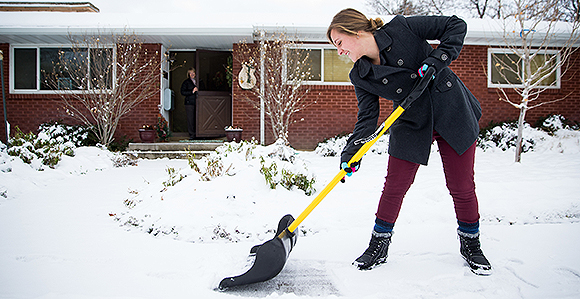BYU Study Finds Youth Who Serve Strangers Have a Higher Self-Esteem
Contributed By Marianne Holman Prescott, Church News staff writer

Parents should look for ways to help their kids help others, says BYU School of Family Life professor Laura Padilla-Walker. Her new research shows it can help them have more self-esteem.
Article Highlights
- Study shows that youth who serve strangers have a higher self-esteem than those who don’t.
- Help children form a habit of participating in high-quality volunteering.
Related Links
PROVO, UTAH
Youth who serve strangers feel better about themselves, new research out of Brigham Young University finds. Service to strangers has benefits that go beyond the immediate feelings and consequences.
How service affects self-esteem
The study, published in the Journal of Adolescence, found that youth who exhibited prosocial behavior, such as helping, sharing, and comforting people they did not know, had higher self-esteem a year later. Coauthored by Laura Padilla-Walker, a BYU School of Family Life professor, and her former student, Xinyuan Fu, of Central University of Finance and Economics, China, the researchers found the same findings were not true for those in the study who exhibited prosocial behavior only to family and friends.
“In this longitudinal study we found that when teenagers reported prosocial behavior toward strangers (but not family or friends), this was associated with feelings of higher self-worth one year later,” said Padilla-Walker. “In other words, helping those with whom teens did not have a relationship was associated with feeling better about themselves. This was true at all four ages we assessed these relations, suggesting it is a consistent finding across early adolescence.”
Although researchers have looked at prosocial behavior before—finding that teens who exhibit positive behaviors are more likely to stay out of trouble and have better family relationships—this time the focus looked at how it related to self-esteem.
“We know from a few past studies that self-esteem is associated with prosocial behavior, in that those who are more confident help more,” said Padilla-Walker. “But the current study suggests that the relationships go both ways and that prosocial behavior or helping also promotes self-esteem. This is especially important during adolescence when self-esteem generally dips, especially for females.”
Conducting the study
Drawing from a group of 681 adolescents in two U.S. cities, ages 11–14, researchers tracked the youth at four different time points, starting in 2008 and continuing through 2011. Participants of the study responded to 10 statements to assess self-esteem. Statements included sayings such as “I feel useless at times” or “I am satisfied with myself.” The prosocial behaviors—such as kindness and generosity—were then measured by self-reports such as “I help people I don’t know, even if it’s not easy for me,” and “I go out of my way to cheer up my friends,” or a statement about helping one's family.
“Not all helping is created equal”
“The current study is also unique in finding that this relationship is unique to prosocial behavior or helping behavior toward strangers,” Padilla-Walker said. “Past research has found that prosocial behavior toward strangers is uniquely protective against problem behaviors, and this study builds on that research to highlight the unique role it also has on promoting positive outcomes, such as self-esteem.”
Recognizing that helping family and friends is a good way to live, Padilla-Walker said “not all helping is created equal” when it comes to some of the benefits, and it is the service to strangers that really impacts self-esteem.
“It is important to note that although being prosocial toward family and friends was not linked to self-esteem, other studies have found it to be linked to other positive outcomes, namely relationship quality with family and friends,” she said. “So helping those with whom teens have a relationship is still a wonderful thing to promote. That being said, helping strangers—or for Church members, the widow and orphan and those who Christ helped—is something a little different and seemingly unique.”
Help children serve
Her advice to parents: help children serve.
“The best thing parents can do is to provide high-quality opportunities for young people to serve strangers,” she said. “By high quality I mean that youth need to be able to see the positive impact of their behavior. Studies have shown that when teenagers get involved in volunteering, especially high-quality volunteering, they are more likely to continue to volunteer throughout their lives.”
Serving others as a family can be a great family home evening activity or fun opportunity, Padilla-Walker said. Parents can help youth organize a group to serve together. Helping young people to forget themselves and help those who are less fortunate can provide positive outcomes.
“It is generally seen as more high cost or challenging for young people to help those who are outside their comfort zone, but in addition to helping those close to home, when we stretch and help others who are in need, the benefits abound,” Padilla-Walker said. “During a time when self-esteem can be fragile and young people can tend toward self-focus, helping those who are in need is a great way to turn the focus toward others and help individuals feel better about their ability to make a difference.”
Find local service opportunities for youth and families at JustServe.org.
